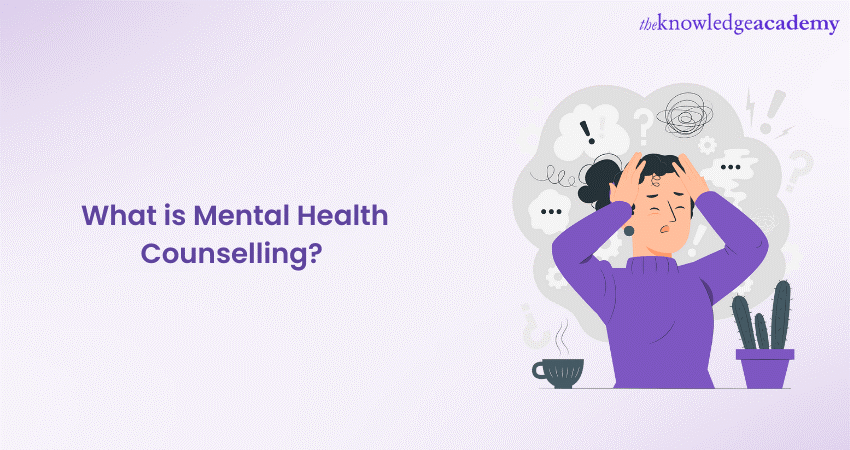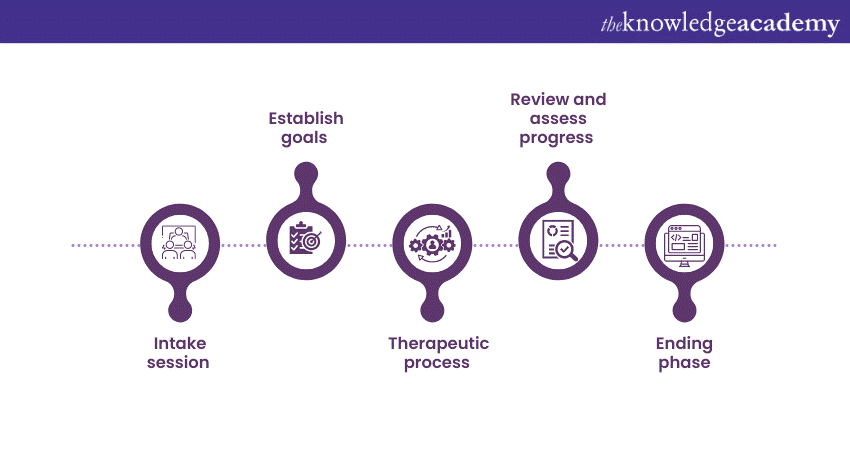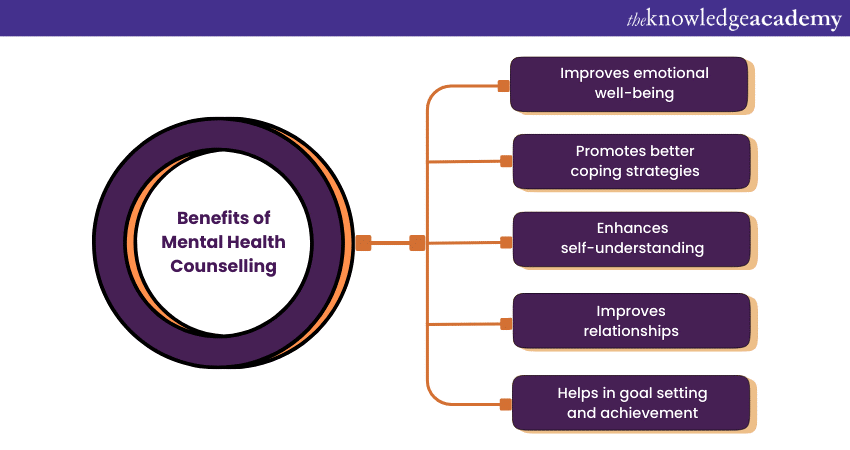We may not have the course you’re looking for. If you enquire or give us a call on +91-181-5047001 and speak to our training experts, we may still be able to help with your training requirements.
Training Outcomes Within Your Budget!
We ensure quality, budget-alignment, and timely delivery by our expert instructors.

Mental Health is key to our overall well-being, affecting how we think, feel, and act. However, just like physical health, Mental Health is also prone to challenges and issues, which is where Mental Health Counselling comes into play. It is a therapeutic intervention that assists individuals in managing these challenges, fostering better emotional and Mental Health.
According to Statista, one in four adults suffer from Mental Health issues in the UK. Despite facing these challenges, most people are unaware of the power of Mental Health Counselling. But it’s time to break down the shackles and learn about it. lIn this blog, you will learn what Mental Health Counselling is, its importance, process and benefits. Let's delve deeper to learn more!
Table of contents
1) What is Mental Health Counselling?
2) Factors affecting Mental Health
3) The process of Mental Health Counselling
4)Types of Counselling
5) Benefits of Mental Health Counselling
6) Conclusion
What is Mental Health Counselling?
Mental Health Counselling involves a collaborative relationship between an individual and a Mental Health professional. This partnership facilitates the exploration and resolution of personal, social, or psychological difficulties and promotes personal growth and well-being.
Factors Affecting Mental Health
Major life events can drastically change an individual’s mental state. For example, when someone we care about dies unexpectedly, it can make our Mental Health worse. Things like not having friends, feeling like you are socially excluded, unhealthy lifestyle etc., can also make your Mental Health worse.
There are various other Factors affecting Mental Health, such as childhood trauma, past relationships, and discrimination, which can affect a person negatively. These are some of the commonly found factors, and there are many other reasons which can vary from person to person.
The process of Mental Health Counselling
Embarking on the journey of Mental Health Counselling can often feel like stepping into the unknown. However, understanding the Counselling process can alleviate concerns and provide a clearer picture of what to expect.
Counselling is a structured process that unfolds over time, typically encompassing several stages. While the exact process may vary depending on the Counsellor and the client's unique needs, the following steps can provide you a general overview:

Initial assessment
The Counselling journey usually begins with an initial assessment or intake session. During this stage, the Counsellor gathers essential information about the client's background, health history, current challenges, and goals for therapy. This helps the Counsellor understand the client's situation, forming the basis for the therapeutic plan.
Establishing therapeutic goals
Once the initial assessment is done, the Counsellor and client collaboratively establish therapeutic goals. These goals serve as a roadmap for the Counselling process, helping to guide the direction of therapy. These goals are Specific, Measurable, Achievable, Relevant, and Time-bound, often called SMART goals.
The therapeutic process
After the goals are defined, the therapeutic process begins. This stage is the heart of Counselling. The aim here is to facilitate change, growth, and healing. It involves various therapeutic techniques tailored to the client's needs and goals, which may include the following
1) Cognitive-behavioural strategies
2) Mindfulness practices
3) Expressive therapies
Enhance your leadership skills by learning to identify and manage workplace stress with our Workplace Stress And Mental Health Identification For Manager – Sign up today!
Regular review of progress
Throughout the Counselling process, it's essential to regularly review and assess the client's progress towards their therapeutic goals. This ongoing evaluation ensures that the Counselling remains effective and adjusts as necessary to the client's evolving needs.
Termination
The final stage of the Counselling process is termination. This occurs when the client and Counsellor agree that the therapeutic goals have been met or significant progress has been made. This phase involves discussing the client's growth, reflecting on the therapy journey, and planning for the future. It's a time for celebration, reflection, and preparation for continued growth outside the Counselling environment.
Remember, the Counselling process is not a straight line; it's a journey with ups, downs, twists, and turns. However, the commitment and support of a skilled Counsellor's support can lead to profound personal growth and improved Mental Health.
Types of Counselling
There are several Types of Counselling. However, out of these many, the key to a successful Counselling session is to identify with which type of Counselling is the client are comfortable with. Discussed below are some of the popular types of Counselling:
a) Psychoanalysis: This Counselling type helps you evaluate your past. An experienced Counsellor helps you to understand why you act, behave, and think the way you do to-day and how your behaviour is affected by your past experiences.
b) Group therapy: An experienced Counsellor leads a group therapy session. The idea is to build a confidential place where people with same issues come together to share their feelings. It helps them to free their minds and help each other.
c) Behaviour therapy: This therapy mainly focuses on changing unwanted and un-healthy behaviours. It encourages one to develop good habits and behaviour by using rewards.
d) Cognitive therapy: This kind of therapy is based on the basic idea that the way you think can affect your actions and feelings. Counsellors use this therapy to help you change your thinking mechanism to feel better and behave better.
Transform your understanding of Mental Health and well-being with our Mental Health And Wellbeing Training – Sign up now!
Benefits of Mental Health Counselling

Embarking on the journey of Mental Health Counselling can be a life-changing decision. It offers numerous benefits that can significantly enhance an individual's emotional, mental, and overall well-being.
While dealing with specific Mental Health concerns, experiencing challenging life events, or simply wanting to understand yourself better, Counselling can be a powerful tool. Here are some of the key benefits that Mental Health Counselling can provide:
Improves emotional well-being
One of the primary benefits of Mental Health Counselling is improved emotional well-being. Counselling can provide tools and strategies to manage emotions effectively, reduce stress, and alleviate anxiety and depression. It can also help improve mood, boost happiness, and enhance overall quality of life.
Promotes better coping strategies
Life is full of challenges. Counselling equips individuals with healthier coping mechanisms to navigate these challenges. This can involve learning new skills like problem-solving, stress management, and mindfulness, which can be incredibly beneficial in managing life's ups and downs.
Enhances self-understanding
Counselling can help individuals gain a deeper understanding of themselves. It provides a space to explore thoughts, emotions, and behaviours, improving self-awareness and self-esteem. This self-understanding can be a stepping stone to personal growth and self-improvement.
Improves relationships
Interpersonal relationships can often be a source of stress and conflict. Counselling can help improve communication skills, increase empathy, and foster healthier, more fulfilling relationships. Whether it's issues in a marriage, family conflicts, or problems in friendships, Counselling can provide the tools to navigate and improve these relationships.
Helps in goal setting and achievement
Counselling can also assist in setting and achieving personal goals. This can range from career goals to personal development goals. With the help of a Counsellor, individuals can define clear, achievable goals and develop strategies to reach these goals.
The benefits of Mental Health Counselling extend far beyond the counselling room. It's a powerful resource that can significantly improve Mental Health, personal growth, and overall quality of life.
Conclusion
We hope that after reading this blog, you have understood everything about Mental Health Counselling. Counselling for Mental Health can be a powerful tool for anyone seeking to improve their emotional and mental well-being. If you're wondering how to improve mental health, it's about taking that first step up the staircase, even if you can't see the whole journey yet.
Enhance your leadership skills by learning to identify and manage workplace stress with our Workplace Stress And Mental Health Identification For Manager – Sign up today!







 Top Rated Course
Top Rated Course




 If you wish to make any changes to your course, please
If you wish to make any changes to your course, please


